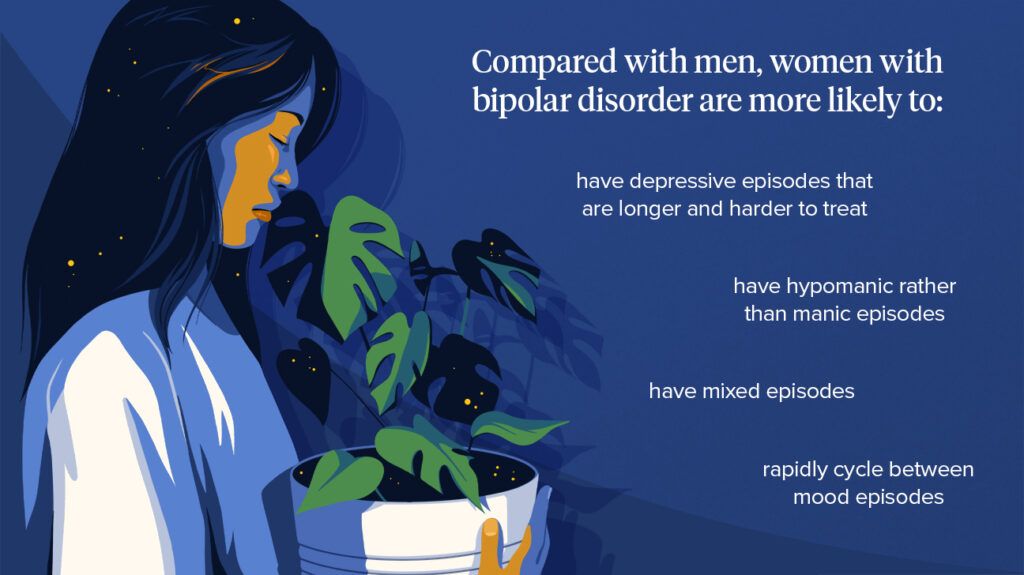Bipolar disorder is a chronic condition that causes mood episodes, which are periods of unusually intense emotion. It often affects women differently than men.
Women with bipolar disorder tend to have more depressive symptoms and less intense manic symptoms than men. This may raise their risk of receiving a misdiagnosis of major depressive disorder.
Understanding how the condition might affect you as an individual can help you recognize symptoms, advocate for a diagnosis, and navigate treatment decisions.
Explore the graphics below to learn some key facts about bipolar disorder in women.
Language matters
Sex and gender exist on a spectrum. We use “women” and “men” in this article to reflect the terms assigned at birth. However, your gender identity may not align with the experiences listed below.
Your doctor may be able to help you better understand your presentation of bipolar disorder and how your specific circumstances will translate into diagnosis, symptoms, and treatment.

Men and women are equally likely to develop bipolar disorder, but it may present differently. Women typically experience the onset of bipolar disorder later in life than men do and tend to have more depressive symptoms.
During a manic or hypomanic episode, someone with bipolar disorder may feel very energized, elated, or irritable. They may show poor judgment and take part in high risk behaviors. Manic episodes are more intense than hypomanic episodes.
During a depressive episode, someone with bipolar disorder may feel sad, worried, indifferent, or hopeless. They may have difficulty concentrating, making decisions, or completing their usual activities.
Because symptoms differ in women, misdiagnosis is common.
Compared with men, women with bipolar disorder are also at higher risk of developing:
- asthma
- hypothyroidism
- diabetes
- migraine
- anxiety disorders
- personality disorders
- post-traumatic stress disorder
- eating disorders
Changing hormone levels may worsen symptoms of bipolar disorder.
Mood stabilizing medication may interact with hormonal birth control:
- Some mood stabilizers may reduce the effectiveness of hormonal birth control.
- Some estrogen-based contraceptives may reduce the effectiveness of certain mood stabilizers.
If you’re at an age when you can have children, this might affect your bipolar disorder treatment, especially if you’re planning to get pregnant.
Some medications pose a higher risk of birth defects than others.
Other treatments may affect your ability to get pregnant. It’s believed that long-term use of valproate leads to abnormal periods and increases the risk of polycystic ovary syndrome (PCOS) and its associated symptoms, including infertility.
Your doctor can help you weigh the benefits and risks of continuing your current treatment plan before or during pregnancy or while nursing.
Bipolar disorder can affect people of all genders, but it tends to affect women differently than men.
Hormonal fluctuations may worsen symptoms of bipolar disorder during the premenstrual phase, pregnancy, postpartum period, and menopause.
Taking medications for bipolar disorder can help limit symptoms. However, some medications may raise the risk of birth defects.
Talk with your doctor to learn more about your treatment options for bipolar disorder. If you’re pregnant or planning to become pregnant, your doctor can help you understand the potential benefits and risks of continuing your current treatment plan or making changes to it.
